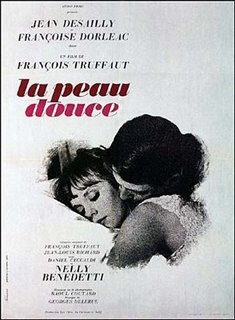
LA PEAU DOUCE (SOFT SKIN)
France, 1964, 119 minutes, Black and white.
Jean Desailly, Francoise Dorleac, Nelly Benedetti, Sabine Haudepin.
Directed by Francois Truffaut.
Soft Skin is an early film from Francois Truffaut, after his debut with The Four Hundred Blows and such films as Shoot the Piano Player and Jules and Jim. Truffaut was a critic and writer, moved into film direction and had an illustrious career – before his untimely death.
The film is a familiar tale of a middle-aged publisher and lecturer, married with a young daughter, who meets a flight attendant and begins an affair with her. He doesn’t understand the flight attendant, makes a decision to move away from his family, is concerned about the effect on his child but not on his wife – which leads to a melodramatic ending and death. The film has a very strong cast including a film a performance by Francoise Dorleac, the older sister of Catherine Deneuve. After appearing in a few films, she was killed in a car accident at the age of twenty-seven.
1. The significance and irony of the title, the indication of themes?
2. The quality of the black and white photography, the musical accompaniment, the use of locations, the emphasis on profiles, on small details for atmosphere and theme?
3. How typically French was the film? In theme, treatment, moral judgment? (How would the same theme be covered by other national directors?)
4. Haw enjoyable was this human drama? How much did it retain the interest, involve audiences in the plight of the hero and his mistress? Where were audience sympathies directed?
5. The importance of the initial hurry: life and jobs, the superficiality and rush of relationships, rush generating needs?
6. How interesting a hero was Pierre? The middle aged man and audiences being able to identify with his needs and plight? The emphasis on the hurry of his home life, the quality of his work, his reputation as a celebrity. the emphasis on his career? The background of literature and his linking with French celebrities? The world of art and reality? The contrast with real life and feelings? His eye for women? His wandering eye in the plane? The nature of his involvement with Nicole? The phone conversations and their ambiguity? The apologies and the drink? The build-up to a relationship with Nicole? The turning on of all the lights? The follow up phone call, the snatches of involvement? The plan for the lecture? Career related to relationship? Trying to escape? The happy sequences with Nicole and the taking of the photographs? The contrast with the separation? Leaving his wife and setting up the flat? No future in the relationship? Audience interest, understanding Und sympathy?
7. Themes of selfishness, realism? The nature of true love - hurting his wife who so loved him, the children? Nicole and using her and her lack of passion for him? His Incessant talking to her? Her capacity for irritating him?
8. The nature of disillusionment in such affairs, the nature of breaking off love, the reconciliations?
9. The finality of death? How melodramatic was the death? How credible?
10. How attractive a heroine was Nicole? Her coolness, her being dressed in white, her lack of passion? Her being a hostess, able to move from one end of the world to the other? The reason for her starting the relationship? Being flattered and flattering Pierre? The amount of involvement? Allowing herself to be used? Waiting for him in Rheims? Enjoying the idle and the photography? The real world and the break? Her decision to be sensible? How much realization of Pierre's feelings and needs did she have? and her melodramatic ways, Italian background, love for her husband? Inability to fulfil his needs, her hurt at the discovery of the truth, her tantrums, the melodrama of her shooting her husband? How credible? The film's insight into her feelings and motivations?
12. The minor characters and their contribution to the film and its plot, to themes, to highlight reactions of the main characters, Odile, the governess, Clement and his persistence in Rheims?
13. How interesting was a conventional plot made? The sense of movement, the details of the scenes at home, lectures, restaurants etc.?
14. Although the film was French, how accurate a picture of the problems of modern society did the film give?